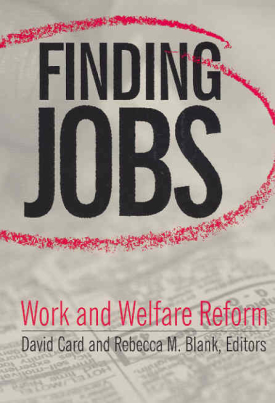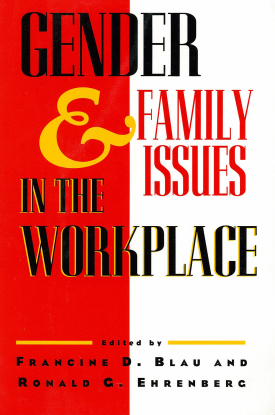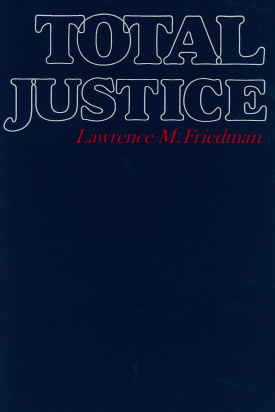
Finding Jobs
About This Book
Do plummeting welfare caseloads and rising employment prove that welfare reform policies have succeeded, or is this success due primarily to the job explosion created by today's robust economy? With roughly one to two million people expected to leave welfare in the coming decades, uncertainty about their long-term prospects troubles many social scientists. Finding Jobs offers a thorough examination of the low-skill labor market and its capacity to sustain this rising tide of workers, many of whom are single mothers with limited education. Each chapter examines specific trends in the labor market to ask such questions as: How secure are these low-skill jobs, particularly in the event of a recession? What can these workers expect in terms of wage growth and career advancement opportunities? How will a surge in the workforce affect opportunities for those already employed in low-skill jobs?
Finding Jobs offers both good and bad news about work and welfare reform. Although the research presented in this book demonstrates that it is possible to find jobs for people who have traditionally relied on public assistance, it also offers cautionary evidence that today's strong economy may mask enduring underlying problems. Finding Jobs shows that the low-wage labor market is particularly vulnerable to economic downswings and that lower skilled workers enjoy less job stability. Several chapters illustrate why financial incentives, such as the Earned Income Tax Credit (EITC), are as essential to encouraging workforce participation as job search programs. Other chapters show the importance of including provisions for health insurance, and of increasing subsidies for child care to assist the large population of working single mothers affected by welfare reform.
Finding Jobs also examines the potential costs of new welfare restrictions. It looks at how states can improve their flexibility in imposing time limits on families receiving welfare, and calls into question the cutbacks in eligibility for immigrants, who traditionally have relied less on public assistance than their native-born counterparts.
Finding Jobs is an informative and wide-ranging inquiry into the issues raised by welfare reform. Based on comprehensive new data, this volume offers valuable guidance to policymakers looking to design policies that will increase work, raise incomes, and lower poverty in changing economic conditions.
REBECCA M. BLANK is dean of the Gerald R. Ford School of Public Policy and Henry Carter Adams Collegiate Professor of Public Policy at the University of Michigan. She is also research associate of the National Bureau of Economic Research.
DAVID E. CARD is Class of 1950 Professor of Economics and head of the Center for Labor Economics at the University of California, Berkeley. He is also research associate of the National Bureau of Economic Research.
CONTRIBUTORS: Patricia Anderson, Timothy Bartik, Kristin Butcher, Janet Currie, Stacy Dickert-Conlin, David T. Ellwood, Tricia Gladden, Douglas Holtz-Eakin, Harry J. Holzer, Hilary Hoynes, Luojia Hu, Robert J. LaLonde, Phillip B. Levine, Susan E. Mayer, Robert A. Moffitt, LaDonna A. Pavetti, Philip K. Robins, Christopher Taber, Jane Waldfogel, Elisabeth D. Welty, Aaron Yelowitz
RSF Journal
View Book Series
Sign Up For Our Mailing List
Apply For Funding

Gender and Family Issues in the Workplace
About This Book
Today, as married women commonly pursue careers outside the home, concerns about their ability to achieve equal footing with men without sacrificing the needs of their families trouble policymakers and economists alike. In 1993 federal legislation was passed that required most firms to provide unpaid maternity leave for up to twelve weeks. Yet, as Gender and Family Issues in the Workplace reveals, motherhood remains a primary obstacle to women's economic success. This volume offers fascinating and provocative new analyses of women's status in the labor market, as it explores the debate surrounding parental leave: Do policies that mandate extended leave protect jobs and promote child welfare, or do they sidetrack women's careers and make them less desirable employees?
An examination of the disadvantages that women—particularly young mothers—face in today's workplace sets the stage for the debate. Claudia Goldin presents evidence that female college graduates are rarely able to balance motherhood with career track employment, and Jane Waldfogel demonstrates that having children results in substantially lower wages for women. The long hours demanded by managerial and other high powered professions further penalize women who in many cases still bear primary responsibility for their homes and children. Do parental leave policies improve the situation for women? Gender and Family Issues in the Workplace offers a variety of perspectives on this important question. Some propose that mandated leave improves women's wages by allowing them to preserve their job tenure. Other economists express concern that federal leave policies prevent firms and their workers from acting on their own particular needs and constraints, while others argue that because such policies improve the well-being of children they are necessary to society as a whole. Olivia Mitchell finds that although the availability of unpaid parental leave has sharply increased, only a tiny percentage of workers have access to paid leave or child care assistance. Others caution that the current design of family-friendly policies may promote gender inequality by reinforcing the traditional division of labor within families.
Parental leave policy is a complex issue embedded in a tangle of economic and social institutions. Gender and Family Issues in the Workplace offers an innovative and up-to-date investigation into women's chances for success and equality in the modern economy.
FRANCINE D. BLAU is Frances Perkins Professor of Industrial and Labor Relations at Cornell University and research associate of the National Bureau of Economic Research in Cambridge, Massachusetts. At Cornell University, she is also research director of the School of Industrial and Labor Relations, director of the Institute for Labor Market Policy, faculty associate of the Cornell Employment and Family Careers Institute, and affiliate of the Women's Studies Program.
RONALD G. EHRENBERG is Irving M. Ives Professor of Industrial and Labor Relations and Economics and director of the Cornell Higher Education Research Institute. He is also research associate at the National Bureau of Economic Research and is president-elect of the Society of Labor Economists.
CONTRIBUTORS: Francine D. Blau, Ronald G. Ehrenberg, Barbara R. Bergmann, Rebecca M. Blank, Ileen A. DeVault, Paula England, Marianne A. Ferber, Claudia Goldin, Jonathan Gruber, Marjorie Honig, Lawrence F. Katz, Jacob Alex Klerman, Renee M. Landers, Arleen Leibowitz, Janice Fanning Madden, Olivia S. Mitchell, H. Elizabeth Peters, Solomon W. Polachek, James B. Rebitzer, Cordelia W. Reimers, Donna S. Rothstein, Christopher J. Ruhm, Myra H. Strober, Lowell J. Taylor, Jackqueline L. Teague, Jane Waldfogel, and Michael Waldman.
RSF Journal
View Book Series
Sign Up For Our Mailing List
Apply For Funding

Total Justice
About This Book
It is a widely held belief today that there are too many lawsuits, too many lawyers, too much law. As readers of this engaging and provocative essay will discover, the evidence for a "litigation explosion" is actually quite ambiguous. But the American legal profession has become extremely large, and it seems clear that the scope and reach of legal process have indeed increased greatly.
How can we best understand these changes? Lawrence Friedman focuses on transformations in American legal culture—that is, people's beliefs and expectations with regard to law. In the early nineteenth century, people were accustomed to facing sudden disasters (disease, accidents, joblessness) without the protection of social and private insurance. The uncertainty of life and the unavailability of compensation for loss were mirrored in a culture of low legal expectations.
Medical, technical, and social developments during our own century have created a very different set of expectations about life, again reflected in our legal culture. Friedman argues that we are moving toward a general expectation of total justice, of recompense for all injuries and losses that are not the victim's fault. And the expansion of legal rights and protections in turn creates fresh expectations, a cycle of demand and response.
This timely and important book articulates clearly, and in nontechnical language, the recent changes that many have sensed in the American legal system but that few have discussed in so powerful and sensible a way.
Total Justice is the third of five special volumes commissioned by the Russell Sage Foundation to mark its seventy-fifth anniversary.
LAWRENCE M. FRIEDMAN is Marion Rice Kirkwood Professor of Law at Stanford University.
Download
RSF Journal
View Book Series
Sign Up For Our Mailing List
Apply For Funding
The Legal System
About This Book
Examines the impact of social forces on the legal system and how the rules and orders promulgated by that legal system affect social behavior. Dr. Friedman explores the relationship between class structure and the work of legal systems in the light of the existing literature and analyzes the influence of the cultural elements contained in a legal system. In a comprehensive analysis of the concept of legal culture, the author sheds new light on the development of our legal norms and the types of legal systems which prevail in a democracy.
LAWRENCE M. FRIEDMAN is Marion Rice Kirkwood Professor of Law at Stanford University.
Download
RSF Journal
View Book Series
Sign Up For Our Mailing List
Apply For Funding
Pagination
- Previous page
- Page 18
- Next page
